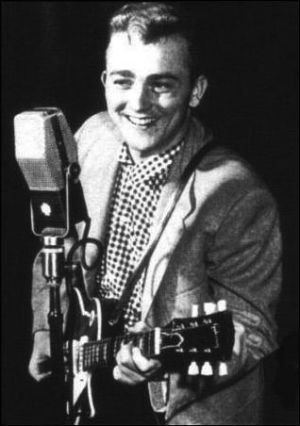Baker Knight
Thomas Baker Knight, Jr (born July 4, 1933 in Birmingham; died October 12, 2005 in Birmingham) was a notable songwriter and bandleader.
Knight's father died in 1939 and he was raised primarily by relatives. He attended Ramsay High School and learned to play guitar while serving in the Air Force. After leaving the service, he attended the University of Alabama, where he wrote music in his spare time. Unable to make ends meet he returned to Birmingham and took drafting classes, working as a technical illustrator and draftsman.
In 1956 he founded a rockabilly group, The Knightmares. Their debut single, "Bop Boogie to the Blues", was released on Birmingham's Kit Records that year. The next release, "Bring My Cadillac Back", was a local hit and was picked up for national distribution by Decca Records. Though it sold 40,000 copies in two weeks in stores, radio stations declined to provide what they considered to be free advertising for Cadillac. Decca held on to Knight and had him release three solo records which featured arrangements by Ray Ellis, "Reelin' and Rockin' (Bippin' and Boppin' Over You)", "Just a Little Bit More", and "Love-A, Love-A, Love-A". None of them sold well, and Decca dropped him afterward.
Knight moved to Hollywood in 1958 to start a career in film, but with little success. While there, he befriended Eddie Cochran and Cochran's girlfriend, songwriter Sharon Seeley, who helped him get work as a songwriter in his own right. Based on his own experiences of rejection in Los Angeles he wrote the song "Lonesome Town", which became a hit for Ricky Nelson in 1958, as did the B-side, Knight's "I Got a Feeling". Nelson continued to record Knight's songs, many of which became hits, such as "Never Be Anyone Else But You".
Because he had signed a recording deal with Coral Records, Knight passed on Nelson's request to record "Just Relax". Knight's version, with Cochran on guitar, was released in 1959. Neither it nor the follow-up, "Pretty Little Girl", sold well, and Coral became the next label to drop Knight from its roster.
Knight then wrote the song "The Wonder of You" for Perry Como, but, at the behest of Como's arranger Dick Pierce, Ray Peterson recorded the song instead. It became a hit in the U.S. and United Kingdom. Elvis Presley later recorded the song during a live performance with even greater success.
Knight continued to record solo with RCA, Chess, Reprise, and Challenge, but never with success. Many of the songs he wrote in the mid 1960s made reference to his divorce. Meanwhile Knight's film career began and ended with a part of a minstrel in the 1966 B-movie Swamp Country.
In 1966, Dean Martin picked up "Somewhere There's a Someone", one of eleven of Knight's songs he would cover for Frank Sinatra's Reprise label. Sinatra himself also recorded a handful of Knight tunes, including "Anytime at All". Later in that decade, Knight wrote psychedelic music for the West Coast Pop Art Experimental Band, also on Reprise.
In the 1970s Knight turned to country music, writing songs for Ernest Ashworth, Hank Williams, Jr, Jerry Lee Lewis, Dave & Sugar, and Mickey Gilley, whose #1 hit "Don't the Girls All Get Prettier at Closing Time" won Knight the Academy of Country Music's Song of the Year in 1976. Knight's last solo release was "If Only", on Warner Bros. in 1977.
In 1985, Knight returned to Birmingham, suffering from chronic fatigue syndrome and agoraphobia, and his output decreased considerably. In the 1990s he set up his own home studio and self-released several solo albums through his website, including The Way I Hear It, Music Is My Woman, and Music for Romantic Dreamers, the last one all instrumentals. Knight published a memoir entitled A Piece of the Big-Time just before his death in 2005.
Publications
- Knight, Baker (2005) A Piece of the Big-Time. Bloomington, Indiana: AuthorHouse Publishers. ISBN 9781420834321
References
- "Baker Knight" (June 26, 2009) Wikipedia, The Free Encyclopedia - accessed June 26, 2009
External links
- Baker Knight website
- Baker Knight at Allmusic.com
- Baker Knight discography at koti.mbnet.fi
- "Bring My Cadillac Back" on youtube.com
